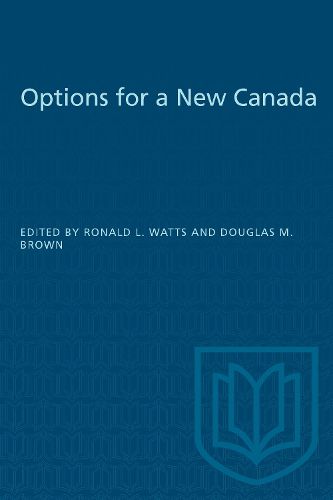Readings Newsletter
Become a Readings Member to make your shopping experience even easier.
Sign in or sign up for free!
You’re not far away from qualifying for FREE standard shipping within Australia
You’ve qualified for FREE standard shipping within Australia
The cart is loading…






The sharp and overwhelming reaction in Quebec to the failure of the Meech Lake Accord has been unprecedented public support for sovereignty and practically no support for the current form of Canadian federalism. This has led to renewed demands for a major constitutional restructuring which, if unsuccessful, is likely this time around to result in the separation of Quebec from Canada. At the same time there is considerable pressure from many other quarters in Canada for other sorts of constitutional change, such as Senate reform and aboriginal self-government. There are also calls for Canadian federalism to be modernized to provide a more effective political response to the global challenges of the contemporary world.
Recognizing that Canada is facing a renewed and potentially disastrous constitutional impasse, the Business Council on National Issues has commissioned the papers in this book to provide a fresh analysis of our difficult constitutional problems. The contributors include some of Canada's leading academic commentators in the fields of political science, economics, philosophy and law.
These papers do not provide a single blueprint for Canada's future; rather they present a range of possible solution and arrangements, each with attendant opportunities and risks. Among the alternatives explored are a restructured federalism, a looser federal union with strong provinces, and an arrangement called "asymmetrical federalism" which would treat Quebec differently than the other nine provinces. Other options include looser forms of confederal economic union, and the possible separation of Canada into two or more independent successor-states.
Choosing among the alternatives will not be easy, but the message of these papers is that if Canadians do not now weigh the alternatives carefully and decide what they want, the options will narrow and could produce unintended and undesired results. The choice is up to Canadians.
$9.00 standard shipping within Australia
FREE standard shipping within Australia for orders over $100.00
Express & International shipping calculated at checkout
The sharp and overwhelming reaction in Quebec to the failure of the Meech Lake Accord has been unprecedented public support for sovereignty and practically no support for the current form of Canadian federalism. This has led to renewed demands for a major constitutional restructuring which, if unsuccessful, is likely this time around to result in the separation of Quebec from Canada. At the same time there is considerable pressure from many other quarters in Canada for other sorts of constitutional change, such as Senate reform and aboriginal self-government. There are also calls for Canadian federalism to be modernized to provide a more effective political response to the global challenges of the contemporary world.
Recognizing that Canada is facing a renewed and potentially disastrous constitutional impasse, the Business Council on National Issues has commissioned the papers in this book to provide a fresh analysis of our difficult constitutional problems. The contributors include some of Canada's leading academic commentators in the fields of political science, economics, philosophy and law.
These papers do not provide a single blueprint for Canada's future; rather they present a range of possible solution and arrangements, each with attendant opportunities and risks. Among the alternatives explored are a restructured federalism, a looser federal union with strong provinces, and an arrangement called "asymmetrical federalism" which would treat Quebec differently than the other nine provinces. Other options include looser forms of confederal economic union, and the possible separation of Canada into two or more independent successor-states.
Choosing among the alternatives will not be easy, but the message of these papers is that if Canadians do not now weigh the alternatives carefully and decide what they want, the options will narrow and could produce unintended and undesired results. The choice is up to Canadians.